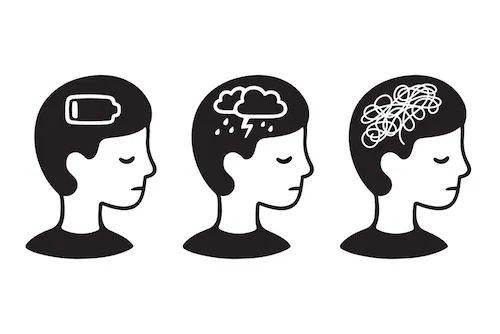
How do we define mental illness?
It isn't nearly as easy as it sounds. If I'm a workaholic, it means I work "too much" and live an unbalanced life. This could be defined as an addiction, or it might not be depending on the severity of the particular case. On one side of the line I'd have a problem: an addiction that interferes with other parts of my life, and on the other side of the line I'd be thought of as "ambitious" and not having any problem whatsoever. In fact, it would be considered a benefit or even a gift.
Considered to be a benefit.
This is what it really all comes down to. Mental illness is unilaterally defined by society and the capitalist regime that governs it. It isn't a mental health problem unless it interferes with society and creates a situation of unprofitability. ADHD and the inability to focus would not be thought of as a mental health problem if there were a bunch of jobs out there that depended on people being able to bounce around across 20 different tasks without any kind of focus required. We can see that this is often not the case, and people need to focus, so we prescribe things like Adderall and literal amphetamines to battle the 'crisis'.
Not all issues are created equally.
Schizophrenia is a pretty weird one. Does your wall socket talk to you? You might have Schizophrenia. But what does the wall socket say? Weirdly enough, this can often be cultural, with schizophrenics in the USA often hearing voices that condone violence, while someone else from another country might hear the soothing encouragement of their ancestors. One of these is a problem, and one is not. Same issue (hearing voices), but completely different classification of mental illness.
It's weird to think of mental illness in this way.
It means that the way we think of mental illness can completely flip on a dime at any moment given a change in society. For example, autism and the autistic spectrum are far less demonized this day an age as a crippling problem. In fact all the people I know that had kids within the last 5-10 years seem to be popping out children on the spectrum... which... I won't comment on other than to say it's very 'weird'.
Technology can change society.
With all these advances in AI, brain-to-computer interfaces, and everything else, we very well may see certain classes of society that were previously thought to be a burden in need of medication to suddenly be valued members of capitalism (hurray!). If anyone with a mental health issue is suddenly much better than others when it comes to new technology, their "condition" is no longer a burden, but a gift. Like if autistic kids are suddenly running around in the metaverse crushing it by using the new AI tools, suddenly autism is no longer something to be thought of as a "downgrade".
Of course I hate to use this example because it's kinda like, "Oh cool so in the Matrix hellscape of the future some people might be doing pretty good within their new digital prison." It was just the easiest example I could think of on the spot; it doesn't really have to be like that.
For example, if crypto itself ushers in a new kind of cooperative economy that leans heavily away from capitalism in the first place, the entire game can change and our perceptions of who is a productive member of society and who is not: will completely be shifted as well. Humanity is in a completely ridiculous middle ground of volatility right now, and it's very hard to tell where the dust is going to settle once it's all over. I can only guarantee that will be one of the weirdest transitions we monkeys have ever undergone.
Conclusion
Like many things in life, mental illness is completely defined by opinion and the ability to generate wealth within the economy. The difference between an idiot savant (genius) and just a plain 'idiot' can be measured by literal dollars (or in many cases artistic ability, which doesn't always pay well).
The more an illness interferes with our ability to do what society wants us to do, the worse we classify the 'illness'. When this condition bleeds out and starts affecting other people around the 'infected', the problem becomes compounded exponentially and is often thought to be a good justification for institutionalization and the removal of freedom. Of course in these cases often the accused has perpetrated actual crimes against their fellow man and ends up avoiding regular jail due to the condition.
All this being said, there is clearly a massive shift coming in how society and economy operate, and it's safe to say that shift will change many perceptions we have across the board. Speculating on how exactly this will all go down is quite impossible at this juncture, but will become more clear as crypto gains mainstream adoption and legacy systems continue to crumble around us.